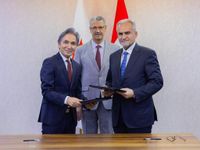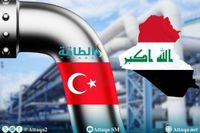The Iraqi government is moving forward with ambitious plans to enhance its oil and gas export capabilities, a critical step for one of OPEC's major producers. The recent announcement of a contract with Italian company MICOPERI and Turkish company ESTA to construct a significant offshore pipeline for oil exports marks a pivotal moment for Iraq's energy sector.
On April 13, 2025, the Deputy Prime Minister for Energy Affairs and Minister of Oil, Hayan Abdul-Ghani Al-Sawad, confirmed the signing of this contract, which aims to bolster Iraq's oil export infrastructure. The new offshore pipeline is designed to handle a capacity of 2.4 million barrels per day, reflecting the Iraqi government's commitment to enhancing its oil exportation capabilities.
This project is part of a broader strategy to secure flexibility and sustainability for crude oil exports from southern ports. The operational capacity will allow for the export of oil from three outlets: Basra port, Khor Al-Zubair port, and the general facility. The project has received the necessary approvals from the Council of Ministers and includes the construction of offshore stations, one at the Basra oil port and another at the Al-Amaya oil port.
In addition to the offshore pipeline, the Iraqi government is also exploring new land-based pipeline routes to facilitate oil and gas exports. A proposal from Turkey to construct new pipelines from Iraq’s Basra Governorate to the Mediterranean port of Ceyhan has emerged as a potential game-changer, particularly since the existing Kirkuk-Ceyhan pipeline has been closed for over two years due to financial disputes.
According to energy-focused sources from Washington, the proposal to build new pipelines does not involve the contentious Kirkuk-Ceyhan line and aims to increase Iraqi oil and gas exports significantly. The proposed route will extend from Basra, passing through the Anbar Governorate to the city of Silopi in southern Turkey, thus avoiding the complexities associated with Iraqi Kurdistan.
The Turkish Minister of Energy, Alparslan Bayraktar, emphasized that the new pipelines would enhance the connection between Turkey and Iraq, ensuring that Baghdad can export oil efficiently to Mediterranean markets. He noted, "The expansion through the pipelines with Iraqi oil in Basra will help secure Baghdad's supply and ensure the delivery of supplies to the markets of the Mediterranean Sea." This development is particularly crucial as Iraq seeks to diversify its energy export routes and reduce dependency on existing, troubled pipelines.
Furthermore, the Turkish proposal includes plans for a gas pipeline that would transport 5 billion cubic meters of gas reciprocally between Iraq and Turkey. This could significantly alleviate Iraq's energy demands, especially as the country aims to meet local gas needs and reduce reliance on Iranian gas imports, which currently account for a substantial portion of its electricity generation.
Despite the optimistic outlook, the proposed pipeline projects face several challenges. Security concerns along the proposed routes, particularly in areas affected by past conflicts, could hinder construction and operational stability. Additionally, the ongoing disputes between Iraq and Turkey regarding the Kirkuk-Ceyhan pipeline remain unresolved, potentially complicating future agreements.
Moreover, the Iraqi government is also focused on addressing its domestic electricity crisis, which heavily relies on gas supplies. The Turkish proposal aims to provide Iraq with necessary gas supplies, but Baghdad has yet to comment on how this aligns with its long-term energy strategies.
As part of its broader energy strategy, Iraq is targeting the completion of a gas hub by 2028 to avoid flaring gas and to utilize its vast, yet underexplored, gas reserves. The plans not only involve oil and gas pipelines but also the enhancement of electricity exports from Turkey to Iraq, which could help mitigate the pressure from reduced Iranian gas imports.
The Turkish project is seen as a significant opportunity for both nations. Turkey aims to become a vital energy hub in the region, leveraging Iraq's resources while ensuring a steady flow of energy supplies to Europe and beyond. This move aligns with Turkey's strategic goals to enhance its energy security and diversify its import sources.
In summary, the recent contract for the offshore pipeline, along with Turkey's proposal for new land-based pipelines, represents a critical step for Iraq as it seeks to revitalize its oil and gas sector. The collaboration between Iraq and Turkey could pave the way for a more integrated energy market in the region, although significant challenges remain on the horizon.



